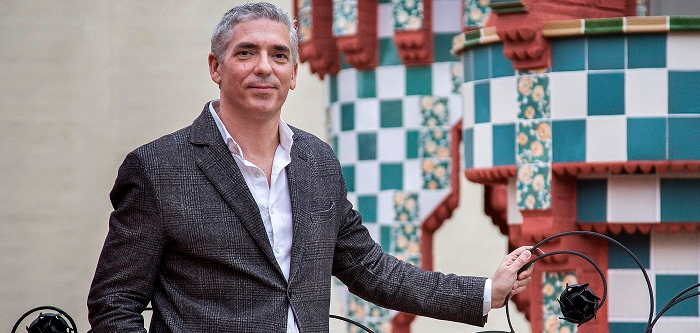"Barcelona is playing in the Champions in terms of culture"
An expert on the connection between tourism and culture, he advocates a new discourse to explain better what the city offers.

23-02-2018 | Interviews
Joan Abellà
Director of Casa Vicens
Culture is key to standing out in a globalised world and competing with other tourist destinations. The culture available in Barcelona and nearby, "is playing in the Champions", with attractions as powerful as the CCCB, MACBA, Picasso Museum, Fundació Tàpies, Fundació Miró and, just 45 minutes away by train, the Dalí Theatre-Museum. These attractions combine with the wealth of architecture and design, both old and new, and world class gastronomy. But we need "more faith" and a new discourse to "explain properly" the plurality and diversity of this part of the city's heritage, starting with the residents themselves, who are the best influencers we could ever have.
These are the strong words from Joan Abellà, director of Casa Vicens, Antoni Gaudí's first residential project which has just been opened to the public as a museum, so that the last modernist World Heritage site still to open to the public is now accessible to everyone. Abellà, who shuns the term cultural manager, is considered a specialist in the use of leisure time. He firmly believes that culture "is essential for transforming the city" and is in favour of talking about the model of the city, not the model of tourism. The resident-international visitor-user triangle, with different intensities and ways of using cultural facilities, is therefore fundamental to correct planning. He is also committed to strengthening the connection between culture and education, making museums not just places for contemplating treasures of the past, but also places of innovation, research and synergies with universities.
A law graduate, he joined the culture sector from the legal side, working as an adviser for the Catalan Government's Drama Centre, the Music and Dance Space and the Film Archive. At just 29 years old he came into contact with the culture-tourism sector when he was appointed managing director of Poble Espanyol in Barcelona, which he relaunched with a wide range of concerts and theatrical offerings. The success of his proposals catapulted him to the MACBA, which he managed from 2008 to 2016. "Cultural facilities are always and without exception for residents and at the same time, for me they are one of the best ways we can showcase the city to the world", he tells us.
On the legacy of Antoni Gaudí, he believes that "we must make an effort to incorporate it systematically into a wider city discourse". He is in favour of a wide and systematic understanding, reaching much further than the current portrayal of an isolated genius. "Modernism perfectly explains an extremely important time in the history of our city, and we cannot ignore it, just as we cannot ignore its highs and lows, just like any other time in history".
A long-time resident of Barcelona's Gràcia district, he now lives outside the city but every day first thing in the morning he swims at Club Natació Barcelona and, when he can, swims in the sea. When he walks around Casa Vicens it is clear how much he loves the small details that make Gaudí's first residential piece unique, after its rebirth as a result of a "sustainable" sponsorship project by Morabanc, the entity that owns the building.







